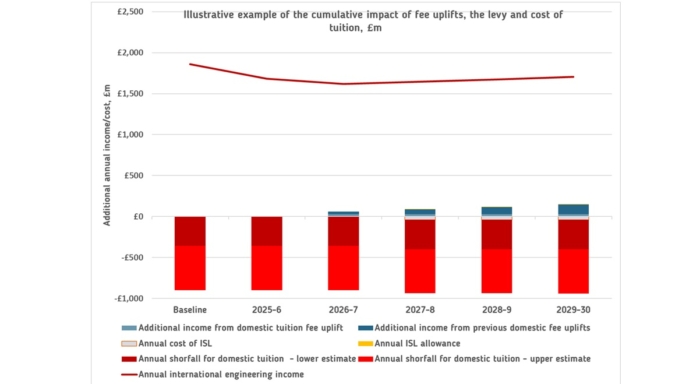At our recent series of support webinars for EPC Reps in member institutions, Chief Executive Johnny Rich gave the following run-down of what’s going on in higher education, politics and engineering policy.
International students
I’m sure you’re aware that there has been a lot of discussion lately, particularly among politicians, about the reliance of the HE sector on international students and whether the government should cut the graduate visa route, which allows international students to stay for up to 2 years after graduation, to limit immigration. This follows steps last year abolishing visas for postgrads to bring dependants. This is assumed to have been the main cause for the drop in international applicants by perhaps a third.
The graduate visa route has come and gone in recent years, but is generally considered to be a massive economic success story, generating tens of millions for the economy directly and tens of billions through the increase in international students particularly to generally lower tariff institutions.
The recent flurry was sparked by the fact that the Migration Advisory Committee was due to deliver the report that James Cleverly, when he was Home Secretary, commissioned them to conduct into the Graduate Visa Route. In advance of the report, various right wing MPs, such as Neil O’Brien, and think tanks, like the Centre for Policy Studies and Policy Exchange, started calling for the scrapping of the GVR and other politicians like Jo Johnson and David Willetts as well as the HE sector started warning that would be a disaster. Their argument is that this isn’t the right or popular way to reduce immigration and that international students should be removed from the immigration targets instead.
The report came out and to the relief of many VCs, it said the GVR was not abused and was generally a good thing that should be retained. The critics shifted gear to attack the MAC’s terms of reference and called on Sunak to scrap it anyway.
Skip forward to today and it seems there has been an internal discussion in the cabinet with Cameron telling Sunak not to listen to the immigration headbangers. That argument appears to have won. However, there has been a lot of use of the phrase ‘brightest and best’ and Sunak might still announce restrictions to which unis can recruit international students and how many of them. These might be based on courses (unlikely) or on league table positions (more likely, but more ridiculous).
Precarity
This is a critical issue because of the financial precarity of the HE sector. The English regulator, the OfS, last week published a grim financial outlook suggesting most unis would be operating at a loss for at least the next 2 to 3 years.
This is what lies behind the more than 50 unis that have announced redundancies. Most of these are rumoured to be falling in arts and humanities, but there’s no actual data. This makes sense as the first place for the axe to fall, especially practice-based arts courses that are expensive to run and in recent settlements from DfE, their funding has in most cases been cut. But there’s a risk of ‘first they came for the arts and I did not speak out, because I was not an arts department’. Traditionally cheaper arts & humanities courses have cross-subsidised more expensive engineering which would otherwise run at a loss. If the arts courses go, that put engineering at greater risk.
Engineering is also somewhat protected by the fact that it involves expensive facilities and equipment, often with long-term financial commitments and its expensive to cancel those or to be flighty about moving in and out of them. However, it also costs a lot of money to maintain and replace equipment and there comes a point when capital costs have been defrayed, and ongoing costs exceed income. There is little cause for comfort.
Meanwhile, in Scotland, which operates a more direct funding model more like the one England used to have, the HE budget has been cut by £28mn, which in real terms is a significant – some would say unsustainable – cut. The per capita funding is already lower.
Election
None of the parties has announced policies for HE yet, but there’s an increasing recognition from Labour that the funding situation in England is not fit for purpose. Their main concern however is student support rather than the HE budget. Rightly so according to a recent study by HEPI suggesting that students need just over £18k a year to live on. The maximum student maintenance loan provides about half that amount. For engineering students, obviously, the opportunities to do paid work in term-time to make up the shortfall are extremely limited.
Labour also has higher spending priorities: in particular health. Bridget Phillipson has committed to a ‘more progressive’ repayment mechanism for student loans, so we might see some explanation what that might mean in their manifesto. The Conservatives aren’t in the mood for change and most of their policies are likely to be around continuing the themes around free speech and so-called ‘rip-off’ degrees with probably more antipathy towards international students’ contribution to immigration.
In Scotland, there is some discussion about the introduction of top-up fees, but mostly among think tanks at the moment.
The National Engineering Policy Centre which is a group representing the PEIs and coordinated by the RAEng is putting together a series of short manifestos for the engineering sector. We’ve fed into that process, especially the paper on education and skills, the first draft of which made only one reference to HE.
EAB
The EAB is the Engineering Accreditation Board, a process of joint accreditation by two or more PEIs. For many years this was, in effect, run by the Engineering Council which provided a secretariat. It has become too much of a financial burden for them though and the PEIs weren’t keen to pay them to do it. So the PEIs invited bids to run it, but, as I understand it, didn’t invite EngC to submit one. As I understand it, the only bid was from IET which now looks set to take over. We’re concerned about domination by one PEI and will try to engage with them as the situation evolves. Update available.
T Levels & The Advanced British Standard
As you’re probably aware, the English Government has been defunding level 3 vocational courses like BTECs in the hope of encouraging ever greater numbers of students, schools and colleges to choose T levels instead. Even more courses that are being cut were announced this week. There are several critical differences between T levels and BTECs: T levels involve at least 45 days of work placements; they’re intended to be equivalent to 3 A levels and therefore, unlike, BTECs, you can only take one and they generally cannot be mixed with, say, Maths A level. T levels also have higher entry requirements than BTECs.
We’ve been conducting research into the maths content of T levels and how it compares to A levels in terms of its appropriateness as an entry route into engineering. The draft version of the study is available and the final version will go live in the next couple of weeks. The short answer is that ‘it depends’. T levels tend to teach maths in a more applied way. That’s a massive oversimplification and I do encourage you to read the report.
Meanwhile, as you may have heard Sunak wants everyone to study Maths to 18 as part of a new qualification the Advanced British Standard to be introduced in 10 years’ time to replace A levels and T levels. It’s easy to dismiss this as pie-in-the-sky, but the DfE has allocated 60 staff to it and there is an acknowledgement beyond the Conservatives that level 3 qualifications in England are too narrow. We’re feeding in to the consultations and I was speaking at a Westminster Forum event about it this month.
LLE delays
The Lifelong Learning Entitlement Act was passed last year which is supposed to revolutionise lifelong education, moving all tertiary education funding onto a credit-based model. That includes degrees. Students would have in effect an individual learner account equivalent to the cost of a 4-year degree or to masters level. This was supposed to start from 2025, but last month, the government announced a ‘phased rescheduling’, which in effect pushes it back a year.
There’s scepticism that LLE will have the desired effect because the pilot programme didn’t manage to prove there was any significant demand among potential students to be able to get into debt for short, stackable courses. Also, as far as I’m aware, universities haven’t leapt at the chance to resolve the problems around portable credit.
LLE may end up being little more than a reframing of the fee system. There is however an acknowledgement from different parties that reskilling and upskilling needs to be encouraged, so watch this space.
Research funding
Last year, the EPSRC published Tomorrow’s Engineering Research Challenges, which was written by Helen Atkinson and Peter Bonfield, two long-standing friends of the EPC. It was described as a discussion around the research priorities that EPSRC might apply over the next ten years, with a big focus on sustainability, but it’s less of a discussion and more like guidance about the kinds of research projects that EPSRC will be looking to fund. There will be more about this at the EAN Congress in June.
Also at the Congress, we’ll have a representative from ARIA, the blue sky research funding pot that was possibly Dominic Cummings’ main contribution to society apart from boosting tourism to Barnard Castle. ARIA has started issuing calls for proposals and so it’s worth signing up to receive those or keeping an eye on the latest news blog on the EPC website.
There are many other topics I could talk about such as franchising, research security, freedom of speech, the Skills Commission, the NEPC pronouncements on water quality, drop outs, a postgrad student survey, etc, etc, but do feel free to ask me about those or anything else if you want to.




